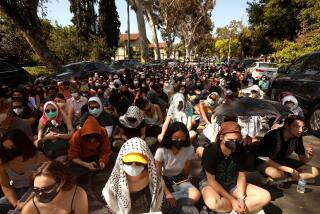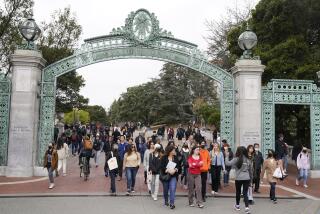Op-Ed: Campuses are breaking apart into ‘safe spaces’

On a college campus, a “safe space” is a room where students can discuss problems they share, sheltered from epithets and other attacks. (Jan. 5, 2017)
The meaning of a “safe space” has shifted dramatically on college campuses. Until about two years ago, a safe space referred to a room where people — often gay and transgender students — could discuss problems they shared in a forum where they were sheltered from epithets and other attacks.
Then temporary meeting spaces morphed into permanent ones. More recently, some advocates have turned their attention to student housing, which they want to turn into safe spaces by segregating student living quarters. Who would have imagined that the original safe space motive — to explore issues in an inclusive environment — would so quickly give way to the impulse to quarantine oneself and create de facto cultural segregation?
Safe space activism stems primarily from the separatist impulses associated with the politics of identity, already rampant on campus. For some individuals, the attraction of a safe space is that it insulates them from not just hostility, but the views of people who are not like them. Students’ frequent demand for protection from uncomfortable ideas on campus — such as so-called trigger warnings — is now paralleled by calls to be physically separated too. Groups contend that their well-being depends on living with their own kind.
In 2015 and 2016, students of color at many colleges called for segregated safe spaces. For example, among the 14-page list of demands made by a group of Oberlin students was that “spaces throughout the Oberlin College campus be designated as a safe space for Africana identifying students.” Oberlin’s president refused, noting the whole list “explicitly rejects the notion of collaborative engagement.”
Encouraging students to engage with the unfamiliar and account for their ideas used to be one of attributes of a vibrant academic institution.
But other administrators appear to be falling over themselves to satisfy such demands. After the UC Irvine Black Student Union demanded the creation of a Black Scholars’ Hall (“a safe space where Black history, culture, and intellectual thought is celebrated,” according to the petition) in 2015, the initiative was approved within the year. Under the guise of establishing so-called living-learning communities, similar accommodation is provided at UC Santa Barbara and UC Berkeley. The Social Justice Living Learning Community offered by the University of North Dakota indicates that the balkanization of accommodation extends beyond ethnicity to students’ political convictions, too.
It seems the cultivation of identity has encouraged such a psychic and emotional distance between people that some prefer to stay in their bubble everywhere they go. In this vein, Northwestern President Morton Schapiro wrote in the Washington Post last year that it is understandable that black students eating in the cafeteria would not want white undergraduates to join them. “We all deserve safe spaces,” he wrote, and “black students had every right to enjoy their lunches in peace.”
Schapiro’s premise is that everyone should have a place — apparently even a place in the dining hall — where they are sheltered from dissimilar people. He enthusiastically cited a Jewish Northwestern graduate’s endorsement of her own safe space, Hillel House. “She knew that when she was there,” he commented, “she could relax and not worry about being interrogated by non-Jews about Israeli politics or other concerns.”
Encouraging students to engage with the unfamiliar and account for their ideas used to be one of attributes of a vibrant academic institution. Today’s university managers, however, are more likely to be complicit in relieving students of the uncomfortable burden of “being interrogated.”
There are worrying signs that future undergraduates will be even more disposed to embrace such self-segregation than their predecessors. The campaign for establishing a Queer Housing Program at Haverford College expresses the spirit of the times. The president of Brown University Students for Israel, Ben Gladstone, has argued that Hillel House “should serve as a safe space for Zionists on campus.” A leader of UCLA’s Bruin Republicans describes her group as “a space for conservative students to share their opinion without facing criticism or attacks from faculty and students who disagree with them.”
These divisive trends came to a head in November during a UC Students of Color Conference that had as its objective the creation of a space to discuss, dissect and create relevant solutions to issues for this diverse group. According to one account the conference turned into “a kind of ‘oppression Olympics,’ where students argued over which minority group was oppressed the most rather than finding solidarity and understanding amongst each other.”
When everyone retreats to their separate corners, that subverts the foundation on which a tolerant and liberal university is constituted. Whereas historically the university freed its members from their cultural baggage to create a community of intellectual individuals, students in the contemporary era are regarded not as individuals in their own right but as the personification of a cultural group. The popularity of identity politics among insecure millennials threatens to fracture campus life to the point that undergraduates are inhabiting separate spaces and leading parallel lives.
Frank Furedi is emeritus professor of sociology at the University of Kent, Canterbury, England. He is the author of “What’s Happened to the University? A Sociological Exploration of Its Infantilisation.”
Follow the Opinion section on Twitter @latimesopinionand Facebook
MORE FROM OPINION
Jeff Sessions: An attorney general who’s all in for prosecutors
Why members of the Manson family still don’t deserve parole after murdering my sister
Trump hurts himself and the nation by trashing the intelligence community
More to Read
A cure for the common opinion
Get thought-provoking perspectives with our weekly newsletter.
You may occasionally receive promotional content from the Los Angeles Times.






